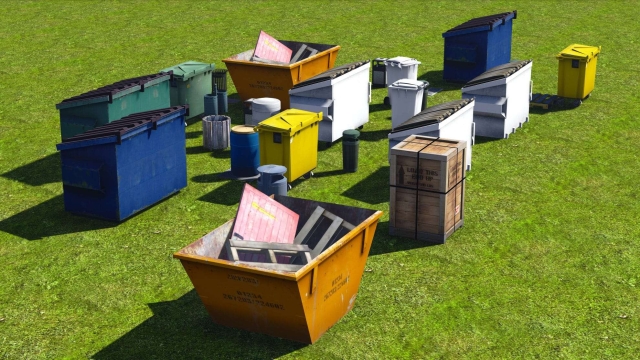
In our fast-paced world, the amount of waste we generate has reached staggering levels. Rubbish removal has become an essential service, helping communities manage their waste and reduce the burden on our environment. This critical process not only involves the physical act of disposing of waste but also encompasses a broader vision of sustainability and environmental responsibility.
Rubbish Removal Sydney
As we increasingly recognize the impact of litter and refuse on our planet, innovative approaches to rubbish removal have emerged, combining art and science to transform how we handle waste. From recycling initiatives to creative repurposing, the methods we use reflect a growing awareness of our need to respect and care for our surroundings. In this exploration of rubbish removal, we will delve into the practices and principles that not only keep our spaces clean but also contribute to a healthier planet for future generations.
The Importance of Rubbish Removal
Rubbish removal is a crucial aspect of maintaining a clean and healthy living environment. Accumulated waste can lead to various environmental issues, including pollution and the proliferation of pests. Proper disposal practices ensure that hazardous materials are handled correctly, preventing potential harm to both humans and wildlife. By prioritizing rubbish removal, communities can promote a healthier ecosystem and enhance the overall quality of life for their residents.
In addition to environmental benefits, rubbish removal plays a significant role in public health. Unattended waste can be a breeding ground for bacteria and pathogens, posing risks such as illness and disease. Regular rubbish removal helps mitigate these hazards, creating safer spaces for recreation and daily activities. It also contributes to improved mental well-being, as a clutter-free environment fosters a sense of order and peace.
Furthermore, rubbish removal supports local economies and job creation. The industry provides numerous employment opportunities, from collection to recycling and waste management. By investing in efficient rubbish removal services, communities can not only keep their surroundings clean but also stimulate economic growth. This demonstrates the vital interconnection between effective rubbish removal practices and the overall betterment of society.
Innovative Rubbish Removal Techniques
The landscape of rubbish removal is evolving with the advent of innovative techniques that enhance efficiency and sustainability. One such approach is the use of smart technology, which integrates applications and sensors to streamline waste collection. Companies now utilize real-time data analytics to optimize routes for collection vehicles, reducing fuel consumption and emissions. This shift not only improves operational efficiency but also minimizes the environmental impact associated with rubbish removal.
Another groundbreaking method gaining popularity is zero waste initiatives, which aim to redefine the way we perceive rubbish. By focusing on reducing waste at the source, these initiatives encourage recycling, composting, and upcycling. Community workshops and educational campaigns raise awareness about responsible consumption and the importance of reusing materials. This proactive approach helps divert a significant amount of waste from landfills, bringing attention to the potential for materials to have a second life.
Lastly, the rise of mobile apps designed for rubbish removal services is transforming consumer interactions with waste management. Users can easily schedule pickups, track their waste disposal, and even receive incentives for recycling efforts. These platforms bridge the gap between consumers and waste management services, making rubbish removal more accessible and engaging. By harnessing the power of technology, we can ensure that rubbish removal becomes a more integrated aspect of daily life.
Environmental Impact of Waste Management
The environmental impact of waste management is significant, affecting air, water, and soil quality. Improper disposal of rubbish can lead to pollution, harmful chemicals leaching into groundwater, and the release of greenhouse gases from landfills. Effective rubbish removal strategies are essential in mitigating these risks. When waste is not managed correctly, it contributes to climate change and degrades ecosystems, disrupting wildlife habitats and harming biodiversity.
One of the major goals of modern waste management practices is to minimize the amount of rubbish that ends up in landfills. Encouraging recycling and composting can significantly reduce the volume of waste produced. These methods not only help to divert waste from landfills but also conserve natural resources and reduce emissions associated with waste processing. By promoting environmentally-friendly rubbish removal techniques, communities can foster a healthier planet and a sustainable future.
Moreover, education and awareness play a crucial role in the success of rubbish removal efforts. Community programs focusing on the importance of responsible waste management can lead to increased participation in recycling and waste reduction initiatives. When people understand the environmental consequences of their actions, they are more likely to adopt practices that promote a cleaner and greener environment. Effective rubbish removal is not just about the physical act of discarding waste; it involves a collective commitment to preserving our planet for future generations.
Choosing the Right Rubbish Removal Service
Selecting a rubbish removal service requires careful consideration to ensure that your waste is handled efficiently and responsibly. Start by researching local providers to understand their offerings and service areas. Look for companies that specialize in the type of rubbish you need to remove, whether it’s household junk, construction debris, or electronic waste. Checking online reviews and testimonials can provide insight into the reliability and reputation of each service.
Next, evaluate the pricing structure of potential rubbish removal services. Many companies offer free estimates, so take advantage of this to compare costs. Be wary of low-priced options that may indicate subpar service or hidden fees. Instead, aim for a company that presents transparent pricing and provides a clear breakdown of costs involved in the removal process. This focus on value rather than just cost can prevent unexpected surprises down the line.
Finally, consider the environmental practices of the rubbish removal service you choose. Many reputable companies prioritize recycling and responsible disposal of waste. Inquire about their policies regarding waste sorting and recycling to ensure that your rubbish is being handled in an eco-friendly manner. By selecting a service that aligns with your environmental values, you contribute to a more sustainable approach to rubbish removal while ensuring your unwanted items are managed properly.
The Future of Waste Management
As we move further into the 21st century, the landscape of rubbish removal is set to evolve dramatically. With rapid advancements in technology, the integration of artificial intelligence and machine learning is beginning to shape the way we manage waste. Smart sorting facilities equipped with sensors and automated systems will enhance efficiency, ensuring that recyclable materials are diverted from landfills with greater accuracy. These innovations not only streamline the rubbish removal process but also reduce human error, leading to a more sustainable approach to waste management.
Moreover, public awareness and participation in rubbish removal practices will be vital in shaping the future of waste management. Communities are beginning to understand the importance of proper segregation and recycling. Educational campaigns and incentives to reduce waste generation can empower citizens to take a more active role in rubbish removal initiatives. By fostering a culture of sustainability, communities can work together to minimize their ecological footprint and embrace practices such as composting and reducing single-use plastics.
Lastly, policies and regulations will play a crucial role in guiding the future of rubbish removal. Governments around the world are adopting stricter regulations regarding waste disposal and recycling rates. Extended producer responsibility programs will push manufacturers to take charge of their products at the end of their life cycle, promoting eco-friendly designs and materials. As these legislative frameworks develop, they will create a more circular economy, ensuring that rubbish removal is not just an end-of-the-line solution, but a crucial component in the lifecycle of products.

